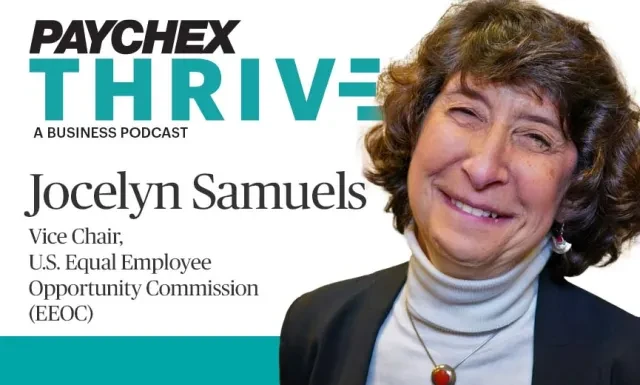La actualización de informes de BOI, la avalancha de currículums de IA y los precios de congestión en Nueva York

Podcast •

Vea
Resumen
The U.S. Supreme Court ruled that the injunction placed on the Treasury to enforce beneficial ownership information reporting requirements is lifted, only to have a lower-court decision keep the stay in place. Gene Marks explains the continued saga businesses have endured regarding BOI. Gene also shares insights on how businesses can combat the chaos created by AI resumes flooding in, as well as how some Manhattan businesses are fed up with congestion pricing cutting into their profits.
Other Resources
- Article: Injunction Remains on BOI Reporting
- THRIVE Business Podcast: How Small Businesses Can Stay Competitive with AI
Ver transcripción
Hey, everyone, it's Gene Marks and welcome back to this week's episode of the Paychex THRIVE Week in Review. This is where we take a few items from the news and talk about them a little bit because they impact your business and mine. So, let's get right to it.
The first has to do with beneficial ownership information. The Corporate Transparency Act – remember that? We were supposed to be reporting our information to the Treasury Department by Dec. 31 of last year. A couple of court cases put that in limbo for a while, and just this past week, according to the Wall Street Journal, the Supreme Court weighed in and actually overrun – overrode – a court decision at a lower court, basically in support of the Treasury Department.
However, according to the Wall Street Journal, the Corporate Transparency Act is still blocked despite their decision because a national injunction blocking the implementation remains in place. Let me read to you some more information.
“The Supreme Court on Thursday – last week – overturned a lower court order that was blocking enforcement of the Corporate Transparency Act. However, a separate national injunction issued earlier this month by a federal judge apparently remains in place and continues to block the law's implementation. The Treasury's Financial Crime Enforcement Network (FinCEN), which is overseeing the tax laws implementation, issued an alert last Friday confirming compliance with the Corporate Transparency Act is not mandatory while the injunction remains in force.
“FinCEN said companies and trusts aren't currently obligated to file beneficial ownership information with it and won't face liability if they fail to comply while the injunction is still in effect. But companies can still voluntarily file their ownership information with FinCEN if they choose to do so.”
Remember that Paychex does provide these services to help report your beneficial ownership information to the Treasury Department. It is not required. There is no date set yet for when this will be resolved. So, right now as you're hearing this, if you do not want to report your beneficial ownership information to the Treasury Department, you are under no obligation to do so.
The next story comes from the Philadelphia Business Journal, and it has to do with AI causing an avalanche in resumés around the country. Let me read this out to you.
“Since the public debut of OpenAI’s ChatGPT in late 2022 and the flood of AI-related tools and services that have since followed, many workers seeking new jobs have turned to generative AI to help automate or speed up what are often repetitive, time-consuming tasks, such as filling out resume fields.
“This has caused a problem for employers. While it's difficult to pinpoint exactly how deeply embedded AI has become,” according to the Philadelphia Business Journal, “ZipRecruiter, the recruiting site, said last year, 50% of jobseekers used AI in some part of their job-hunting process. Since the advent of AI, employers now get double or even triple the volume of applications they did just a few years ago.
“That means that while AI tools have been a game changer, it's created a double-edged sword for applicants and employers both.”
So, what do you do? It's chaos for employers, according to employers, to one expert, because of this avalanche of resumes. Well, some experts are saying that instead of relying on keywords to screen potential employees, companies should implement skill assessments so candidates can demonstrate their competency in real time. That way, you're forcing them to show some of their skills while they're in the application process.
In addition, another expert in the article said that employers should consider integrating these skill assessments and structured interviews earlier in the hiring process to help identify the top talent and to reduce bias in automated screening system.
So, bottom line is this: AI is really taking its hold in the recruitment field. It is doubling the amount of, resumes that are coming in. It's creating chaos for employers who have to sift through all of these. If you don't have an AI tool to lean on, the very least you should enforce some skill training earlier on in the process and that might help weed out some of your candidates.
Our final story comes from New York, Fox 5 News, and it has to do with the dreaded congestion pricing that small businesses and others are dealing with now in New York City. A new congestion pricing law has been implemented where people are being charged as much as $15 a toll for anybody that wants to access in their car south of 60th Street in Manhattan.
Business owners are up in arms about this. One business owner quoted in the Fox 5 News story said that they used to serve 150 patrons a day. Now, they're only serving 50 patrons a day, two-thirds less. They say the customers they do get generally drive into the city to eat lunch.
“I'm more worried about the customers just staying out of the zone because there are so many alternatives,” said the owner of one cafe below 60th Street.
As such, that business owner and a dozen others have filed suits against the state asking for a new environmental impact study be conducted before this toll fully goes into effect. They join some others that are also suing, which includes, Staten Island and New Jersey, as well as the United Federation of Teachers are all suing about this congestion pricing.
So, congestion pricing for the city of New York, not very popular among many of the business owners that are located there. By the way, congestion pricing has been implemented successfully, I believe, in other European cities, but it's having some hard going here in the U.S.
That's the news for this week. Thank you so much for watching. If you need any help or advice or tips on running your business. Sign up for our Paychex THRIVE newsletter at paychex.com/thrive.
I'll be back to you next week for more news to help you run your business. My name is Gene Marks. Thanks for watching and listening.
This podcast is property of Paychex, Incorporated 2025. All rights reserved.

 Apple Podcast
Apple Podcast Spotify
Spotify iHeartRadio
iHeartRadio







